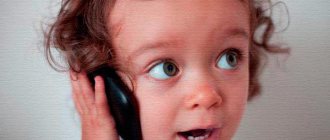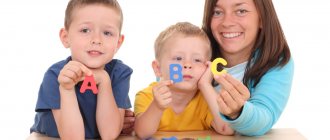Speech development of a child in Moscow:
A normally developing child at all stages of growing up has a set of necessary skills. Deviation from the norm is considered as a delay. This also applies to speech. Not all parents identify warning signs on their own. Specialists from the St. Luke Health and Development Center will help with this. They will professionally assess the child’s speech development in Moscow and prescribe the necessary corrective measures, which are carried out both within the walls of the institute and at the little patient’s home.
Main areas of work
Speech therapy
.
We work with children of all ages and adults. Our speech therapists are involved in the development of speech, phonemic hearing and correct pronunciation of sounds. They also correct OHP, ZRR, alalia, dysarthria, dyslalia, dysgraphia, dyslexia, stuttering, tachylalia, bradyllalia and rhinolalia. We conduct speech therapy diagnostics before entering school, assess the child’s skills and develop an individual program. Neuropsychology
.
Our speech therapy center employs experienced specialists who eliminate the causes of school failure, bad behavior and difficulties in socialization. We help children with diagnoses of mental retardation, ADD, ADHD, etc. Psychology
. We help special children adapt to society, get rid of mental blocks that interfere with the development of speech, communication and cognitive activity.
Baby's speech development skills:
Parents are obliged to monitor not only the baby’s health, but also the harmonious development. A child must gain new knowledge and master skills every day. A delay in the formation of speech skills is diagnosed in a child from the age of three.
By this age, a child can:
- use about 1000 words in speech;
- build sentences with all parts of speech;
- apply cases, gender, number;
- retell a simple fairy tale;
- pronounce your actions;
- do not use lightweight versions of words and onomatopoeias.
If a child does not have these skills in speech, our specialists will help solve the problem.
Symptoms of speech development disorder:
The behavior of children with deviations in the development of speech skills differs from the norm.
Parents should suspect a problem if they notice some of the following signs:
- hyperexcitability;
- excessive passivity;
- lack of plot actions during the game;
- do not understand the names of actions;
- vocabulary consists of several words, most often simplified;
- lack of intonation;
- poorly developed fine motor skills;
- tendency to skip sounds and open syllables.
If you notice one or more symptoms, contact our center for consultation with specialists.
Solving the problem of speech development by center professionals:
The team of our center consists of international-level professionals. The staff of the institute have extensive experience and constantly undergo specialization in the leading correctional centers in the world. Examinations, consultations, and treatment measures are discussed by specialists from various fields, which makes it possible to study problems in children in more depth and collectively choose the optimal tactics for solving them.
All procedures take place in a cozy atmosphere, close to home. The little patient does not experience discomfort; the classes are conducted in a playful manner, without causing tension in the child. Our employees work closely with parents, explaining the nuances of the baby’s condition and the need to carry out prescribed procedures for the development of his speech center. This will give the child the opportunity to grow into a harmonious personality and be fully realized in life.
It's easy to sign up for a consultation.
Treatment
Bed capacity of the Center:
Hospital with 24-hour stay for patients - 80 beds;
Day hospital – 60 places; Hospital at home – 100 beds; Children's department - 150 visits per shift. Structure of the Center for Speech Pathology and Neurorehabilitation:
1. Consultative and diagnostic department 2. Specialized inpatient department with 80 beds. 3. Day hospital for patients with consequences of stroke and neurotrauma on the 30th month 4. Hospital at home for patients with speech disorders and other higher mental functions. 5. Day hospital for adults with logoneuroses at 30 months 6. Phoniatric. department 7. Children's department 8. Department of functional diagnostics. 9. Department of Clinical Psychology. 10. Department of physical therapy and massage. 11. Physiotherapy department with hydropathic clinic. 12. Office of social, domestic and labor rehabilitation. 13. Organizational and methodological department.
Consultative and diagnostic department Objectives of the department:
1. Outpatient examination and counseling of patients referred to the Center for Pregnancy and Prevention. 2. Establishing the form and severity of speech disorders. 3. Assessment of the psycho-neurological and somatic condition of patients in order to determine indications and contraindications for treatment at the Center. 4. Preparation of medical documentation of patients examined by department specialists for the selection committee.
Indications for referral for examination, treatment and neurorehabilitation to the Center:
- speech disorders and other higher mental functions resulting from focal brain lesions - stroke, traumatic brain injury, cancer, infectious, toxic and other diseases in combination with or without musculoskeletal disorders; - stuttering and other speech communication disorders.
to the hospital and outpatient
department of the Center for Staged Rehabilitation Treatment:
- those with a favorable prognosis regarding the restoration of impaired functions of systems and organs and return to work; - capable of movement and self-care.
Contraindications for referral to the Center are:
mental disorders (including psychoses, dementia, severe forms of neuroses and decompensation of psychopathy, epilepsy with frequent seizures, alcohol and drug addiction), causing antisocial behavior of patients;
severe impairment of motor functions, leading to the impossibility of self-care and independent movement of patients; severe hearing and vision disorders that interfere with the neurorehabilitation process; all diseases in the acute stage; chronic somatic diseases in the stage of exacerbation or decompensation; infectious and venereal diseases; malignant neoplasms; cachexia of any etiology; decompensated diabetes mellitus; all forms of tuberculosis in the active stage; circulatory failure II B-III; life-threatening heart rhythm and conduction disorders Department of hospital at home for patients with speech disorders and other higher mental functions
The course of treatment in the “Hospital at Home” is 90 days.
Examination of patients at home by neurologists and therapists 2 times a month. Depending on the psychosomatic state of the patient, speech therapy classes are conducted from 1 to 3 times a week, for a total of 12 to 36 classes per course. The department provides comprehensive and pedagogical activities aimed at restoring higher mental functions, sanitary and hygienic skills, independent movement and self-care of patients. Inpatient care at home is intended for patients with speech disorders and other higher mental functions, suffering from other concomitant somatic and psychosomatic diseases that interfere with independent movement, self-care, causing certain difficulties in mental and social adaptation, excluding active rehabilitation. Rehabilitation at home is prescribed by the selection committee of the Center after the patient has undergone examination in the consultative and diagnostic department. Patients are admitted for treatment as planned. Patients are referred to the selection committee by specialists from medical institutions after the end of the acute period of the disease.
Specialized inpatient department with 24-hour stay for patients .
The department has 80 beds. Patients are accommodated in 1, 2 and 6-bed wards. The course of treatment is 45 days, according to indications - 90 days. Carries out a complex of treatment and rehabilitation, medical, pedagogical and psychological measures to restore higher mental functions, including speech, communication and communication disorders, as well as disorders of the musculoskeletal system that occur in patients who have suffered a cerebral infarction, severe craniocerebral trauma and other focal brain lesions. The department provides medication treatment, individual (including computer classes) and group speech therapy classes (including music therapy), psychotherapy, physical therapy, massage, physiotherapy, reflexology, occupational therapy and other methods. The department employs highly qualified specialists: neurologists, psychiatrists, therapists, functional diagnostics doctors, otolaryngologist, dermatologist, reflexologists, neuropsychologists, speech pathologists, speech pathologists, etc.
Day hospital for patients with consequences of stroke and neurotrauma for 30 beds.
The day hospital provides treatment and neurorehabilitation of patients with the consequences of cerebral infarctions, neurotrauma, who are capable of independent movement around the city. The average duration of treatment in a day hospital is from 45 to 90 days with a frequency of visits depending on the physical condition from 2 to 5 times a week. The day hospital provides 2 meals a day. The department provides medication treatment, individual and group speech therapy sessions (including music therapy), psychotherapy, physical therapy, massage, physiotherapy, reflexology, occupational therapy and other methods. The department employs highly qualified specialists: neurologists, psychiatrists, therapists, functional diagnostics doctors, otolaryngologist, dermatologist, reflexologists, neuropsychologists, speech pathologists, speech pathologists, etc.
Day hospital department for adult patients with logoneuroses.
The department is intended for complex treatment and rehabilitation of patients with logoneuroses (stuttering, etc.).
The department is designed for simultaneous stay of 30 patients during the day. The course of treatment is 90 days, of which: 45 in a day hospital and 45 days in outpatient groups, which function 3 times a week in the evening (from 18 to 21). Patients are formed into groups, the composition of which does not change during the course of treatment (closed groups). A set of medical and pedagogical activities carried out in the department: group and individual classes with psychologists, psychotherapists, speech therapists; physiotherapy, acupuncture, drug treatment, hydrotherapy. Upon admission to the day hospital and discharge from it, an expert assessment of the patients’ condition is carried out
(assessment of speech function and fixation on the speech defect) with subsequent recommendations from the department’s specialists.
Department of Phoniatry . The department accepts for treatment patients with voice disorders of various origins:
— Paresis and paralysis of the larynx after operations and traumatic lesions, as well as after strokes; — nasalization of the voice after surgery on the upper jaw; — hoarseness, weakness of voice after acute and chronic laryngitis; - functional disorders after nervous stress; — age-related and endocrine changes in voice; - restoration of sonorous speech after removal of the larynx.
The department is equipped with modern diagnostic and treatment equipment (fiberscopes, stroboscopes, audiometer, ultrasound coagulator, etc.). Patients receive complex therapy (drug treatment, individual phonopedic sessions, psychotherapy, physiotherapy, etc.). Treatment is carried out on an outpatient basis, the course of treatment is up to 45 days
Department for children and teenagers.
Intended for consultative, diagnostic, therapeutic, pedagogical and psychological assistance to children and adolescents with severe and combined speech disorders, including stuttering, dysgraphia, dyslexia, speech delays and general speech underdevelopment, severe and moderate dysarthria, as a complication of birth injuries, as well as postnatal, local damage to the central system due to traumatic brain injury, stroke and cerebral infarction. The department has highly qualified specialists in the field of speech therapy, psychology, neuropsychology, psychiatry, neurology and pediatrics - doctors and teachers of the highest category, candidates and doctors of sciences. The specialists of the department provide outpatient supervision of children in the form of consultations, courses of group and individual speech therapy and psychological classes, observation of the dynamics of the rehabilitation process under the control of clinical and functional research methods.
Contraindications for treatment in the department are:
- mental retardation, epilepsy, schizophrenia in the acute period, reactive states; - severe hearing and vision impairment; - diseases of the central and peripheral nervous systems, leading to severe disorders in the musculoskeletal system; - general and skin infections; - somatic diseases in the stage of decompensation.
Children with:
- initial stuttering; - relapse of stuttering after a course of treatment; - severe form of stuttering; - alalia.
Children from large families, orphans, and children 6 years old (going to school) have the advantage of enrolling in coursework.
To register for an initial examination for a child, you must prepare the following documents:
1. Referral from the local doctor and speech therapist of the territorial clinic 2. Conclusion of the speech therapist. 3. A detailed extract from a neurologist or psychiatrist (outpatient clinic). 4. EEG (electroencephalogram). 5. Insurance policy.
Department of Functional Diagnostics . Diagnostic methods:
1. Electroencephalography: A) with visual processing (traditional chamber recording of EEG) B) with computer processing and mapping of the rhythm spectrum, which allows objective identification of focal post-stroke, post-traumatic changes, epifoci (cameraless recording). 2. Echoencephalography. 3. Electroneuromyography. 4. Ultrasound Dopplerography of the vessels of the brain and the great vessels of the neck. 5. Registration of constant brain potentials (indirect assessment of the level of metabolism in the brain). 6. Electrocardiography. 7. Rheoencephalography with computer processing. 8. Rheovasography. 9. Ultrasound of internal organs. 10. Transcranial magnetic stimulation (to determine the degree of motor deficit in the limbs).
Department of Clinical Psychology.
The department is a structural subdivision of the Center for Pregnancy and Neuroscience, created to solve a wide range of practical problems: psychodiagnostic, psychoprophylactic, correctional and restorative, advisory. The responsibilities of medical psychologists include: conducting neuropsychological, pathopsychological, personality-typological diagnostics of patients; development, together with other specialists of the Center, of rehabilitation programs (rehabilitation training programs, psychocorrectional and developmental classes); conducting individual and group classes with patients of the Center; carrying out dynamic observations of patients (for the purpose of timely correction and optimization of rehabilitation programs); assessing the effectiveness of therapeutic, psychological and pedagogical measures; counseling patients' relatives.
Department of Physical Therapy and Massage.
The department participates in a comprehensive program of rehabilitation treatment of the patient, the main task of which is the maximum restoration of impaired functions and the development of substitution-compensatory mechanisms that further determine the degree of social and labor adaptation of patients; uses all possible means and forms of physical therapy during the treatment process. The department provides group (45 min.) and individual (30-60 min.) classes; Classes are practiced with one patient 2 times a day for 25-30 minutes. Classes are held with relatives of patients to teach a complex of therapeutic exercises, which should be performed at home. The complex of rehabilitation measures uses the method of dynamic propriocorrection using the “Gravistat” medical suit. The Ballance technique has been introduced into the complex of rehabilitation treatment for patients with ataxia. The department is equipped with modern highly effective simulators. In the absence of contraindications, patients are given courses of manual classical massage. The massage procedure is compiled individually for each patient, depending on the purpose of the massage, taking into account the nosological form of the disease and its clinical picture, as well as the patient’s age and somatic pathology.
Department of Physiotherapy.
The department is equipped with all the necessary equipment that allows physiotherapeutic treatment with a wide variety of techniques (electrotherapy, light therapy, magnetic therapy, laser therapy, etc.). In the process of physiotherapy, the main attention is paid to the use of various techniques, their differentiation depending on the nature of the motor defect, the severity of impaired functions, the location of the lesion, the stage of treatment and the presence of concomitant diseases. Various methods of reflexology are widely used: acupuncture, moxibustion, laser and pharmacopuncture, Su-Jok therapy, scalpuncture, etc. The hydropathic clinic offers therapeutic showers and hydromassage.
Office of social, domestic and occupational rehabilitation (ergotherapy).
The office is designed to restore the work, everyday and social activity of patients with disorders of higher mental and motor functions. The office contains premises equipped with the necessary equipment, manuals, and materials for conducting rehabilitation treatment for patients with motor and speech disorders. Occupational therapy classes are conducted in conjunction with speech therapy individual and group classes.
Organizational and methodological department for speech therapy of the Moscow Department of Health (adult network).
Heads the specialized service of the city of Moscow. Carries out the preparation and certification of speech therapists in Moscow within the framework of the commission for certification of teaching staff working in the healthcare system of the Moscow Department of Health. Every month he holds city conferences on the organization of specialized care in various medical institutions of the city, lectures and clinical discussions. Methodologists of the organizational and methodological department provide consultations to patients and provide the necessary methodological and organizational assistance to specialists. Much attention is paid to the selection and training of personnel to staff specialized rooms. City health care facilities. Quarterly sums up and analyzes the results of the work of specialists at all levels carrying out step-by-step comprehensive neurorehabilitation. Conducts scheduled inspections of the work of specialists at their workplaces. Specialists of the organizational and methodological department have created and maintained a Data Bank of patients who have suffered focal brain lesions and have disorders of higher mental functions, including speech, which makes it possible to trace the stages and dynamics of treatment for this group of patients. Much attention is paid to preparing, conducting and participating in scientific and practical conferences, congresses, and seminars.








